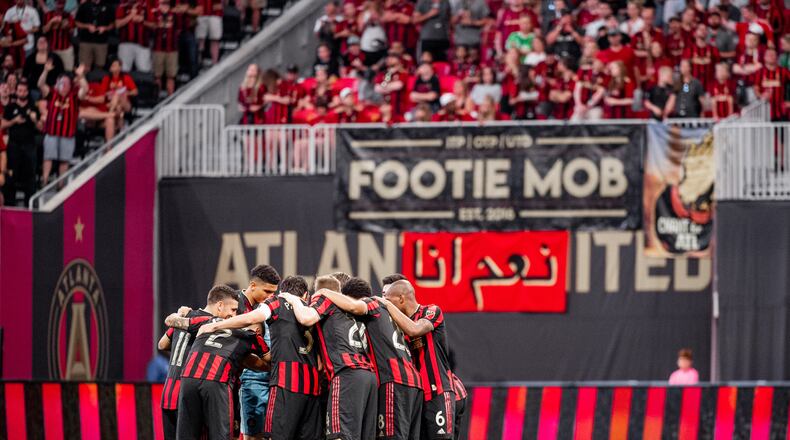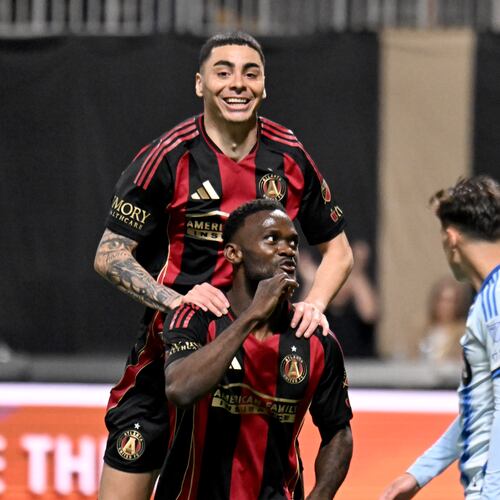Six months into his tenure as manager, this is Atlanta United under Frank de Boer as the team heads into the International break:
• Second in the MLS East in points per game (1.73);
• Trails first-place Philadelphia by two points but has one game in hand;
• Leads league with eight shutouts, matching last year's total, through 15 games;
• Its goal difference of plus-eight is third-best in MLS.
“I always say after six months, you see things that you think, ‘Yeah, these are things we discussed, this is what I want to see from my team,’ ” he said. “I think we see that already. We are playing much more compact when we don’t have the ball, when we cannot press. We are feeling much more comfortable on the ball.”
De Boer was announced as the team's manager on Dec. 23, 2018. He succeeded Gerardo Martino, who led the team to the MLS Cup and won over the city with his grandfather-like personality and sense of humor.
The hiring of de Boer was met with a sense of skepticism because of his failed, short stints as manager of Inter Milan in Italy and later Crystal Palace in England. His time in Atlanta has almost surpassed the time he spent at both of his previous clubs combined.
But there also was optimism because of his record in his first managerial stint at Ajax, the club where he played and later led the Academy.
The pressure, at least for an MLS team, faced by de Boer was immense.
He was taking over a team with a passionate and very interested fan base that was certain to sell its best player, Miguel Almiron (who was sold to Newcastle), while also facing leading the club into its first international tournament with very little time to prep, get to know the players who have been on the roster and those new to the club, put in his preferred formation and tactics, and develop a chemistry.
De Boer worked hard at each of those things, even as injuries to Franco Escobar, Kevin Kratz and later George Bello — to name a few — affected his plans.
The team spent part of training camp in California. When they weren’t practicing or playing, the team hung out in its hotel. De Boer was almost always in the lobby, chatting up players, joining them in card games. He even had dinner with a player and his parents.
It wasn’t the look of a manager who reportedly had lost the players at Crystal Palace.
De Boer worked at developing relationships with the media, taking as much time as needed to answer myriad questions from whichever outlet showed up in Fullerton, Calif.
After nervously eliminating Herediano in the Champions League, the team was bounced out of the tournament in the next round by Monterrey.
At the time, it seemed disappointing.
Atlanta United did defeat the Mexican giants with a 1-0 win at Mercedes-Benz Stadium in the second leg. But decisions made by de Boer in the first game in which he didn’t use subs until the final minutes of a 3-0 loss made the series seem like a missed opportunity.
Upon reflection that included seeing what Rayados did in dismantling Sporting KC, 10-2, in two legs, and then defeating Tigres to win the tournament, made Atlanta United’s result seem better.
League play, at least early in the season, was a different matter.
The team was blown out and lifeless in its opener at D.C. United, a game sandwiched between Champions League series.
Back in Mercedes-Benz, it was held to a draw by expansion club Cincinnati and then Philadelphia. While the first result was a missed opportunity, the 1-1 draw against the Union doesn't seem as bad now because Philadelphia is considered one of the better teams in the East.
But in that Philadelphia game, de Boer changed the formation from three at the back to four, and hasn't changed back since.
The results improved.
Throwing away the loss at Columbus that was played in monsoon-like conditions, Atlanta United took advantage of its time to train in a familiar formation, and to get to know each other and the new manager to win eight of its next 11 games.
Two of the defeats came during the stretch of eight games in 28 days that concluded with Saturday's, 2-0, win against Chicago. During the stretch, the team was forced to fly more than 10,000 miles to play consecutive road games at Vancouver (1-0 win), at New York Red Bulls (1-0 loss) and at Real Salt Lake (2-1 loss).
It was the first time since June 2017 that the team lost consecutive games. It bounced back with wins at home against Minnesota and Chicago.
It finished the stretch taking 18 points from a possible 24, most coming without Ezequiel Barco, who is with the Argentina U20 national team at the World Cup. Barco was arguably Atlanta United's best player until he left following the May 5, 3-0, win at Sporting KC.
“We know what our role is from each individual player in his position,” de Boer said. “Football is always about small details, and we want to improve. Every time we can react when a team plays a different system, and I don’t have to say anything, they already know, ‘OK, they play like this. We are going to play like this. This is going to be my role.’”
The players will get the next five days off before they return to train for the U.S. Open Cup game June 11 at Charleston. Should Atlanta United win, it will play again June 18 or 19 in the tournament’s subsequent round.
It won’t play its next league game until June 26 at Toronto. That will begin another stretch of poor scheduling because the team will play three games in eight days. In July, it will play six games, including a potential massive game July 26 at LAFC. LAFC leads MLS in points (37), goals (39) and goal difference (26).
“Listen, there’s a lot of soccer to be played, a lot of football still,” Atlanta United goalkeeper Brad Guzan said. “It is what it is — the table. You guys read into that stuff a lot more than we do. We certainly know the amount of work that’s gone in to preparing for these games and obviously getting the results that we’ve had. It means nothing if we don’t come back from this break and pick up where we left off.”
De Boer said there is still plenty of room for Atlanta United to improve. Interestingly, de Boer rarely mentions the offense, which until the past two games has struggled, when asked what he wants to see improve.
“For me, football is a lot about transition, and you have to recognize those moments,” he said. “Of course, we are in a quite good position to attack, but I think our (defensive) position we can probably do that better and recognize those moments. Football, normally, is always (a game) where mistakes will decide (the outcome if) a team will win, draw or lose, and we have to try and minimize those things. They have to get that feeling and understand that if I do this, we will be a very hard team to beat.”
xx
X
Southern Fried Soccer Podcasts
Follow me on twitter @DougRobersonAJC
On Facebook at Atlanta United News Now
Atlanta United coverage on the Atlanta Journal-Constitution
Have a question? Email me at droberson@ajc.com
About the Author
Keep Reading
The Latest
Featured



